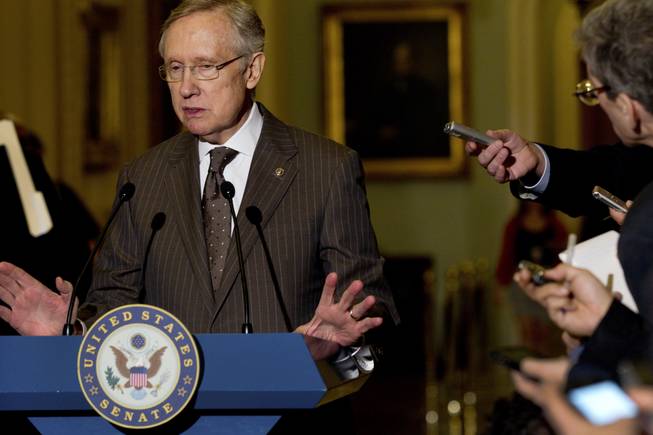
THE NEW YORK TIMES
Senate Majority Leader Harry Reid, D-Nev., speaks at a news conference Nov. 15, 2011, on Capitol Hill in Washington.
Tuesday, Nov. 29, 2011 | 2 a.m.
Sun Coverage
In the weeks remaining until Christmas, Sen. Harry Reid is going to try to persuade a divided U.S. Senate to pass a budget and an extension of unemployment benefits, before expiration dates interrupt federal funding of both. But most of his energy will be spent working on extending and expanding a payroll tax holiday.
Congress approved a payroll tax holiday last year as part of a bill that extended unemployment benefits for 13 months and the Bush-era tax cuts for two years. The bill lowered by 2 percent the Social Security taxes being withheld from paychecks: so instead of a 6.2 percent payroll tax, which is standard, workers paid only 4.2 percent of their earnings (up to the first $106,800 earned annually) in payroll taxes throughout 2011.
Before that break expires at year’s end, Senate Democrats are trying to push a President Barack Obama initiative that would take the idea even further: halving the standard payroll tax for all workers (so 6.2 percent would become 3.1 percent) and for employers too on the first $5 million of their payroll.
“We’re not going to let this lapse,” Reid told reporters Monday, pledging to “give Republicans a chance to vote on it not once, but two, maybe three times.”
“This is an important part of what’s helping American families,” Reid said.
It’s a politically contentious issue, as the expanded vision for the payroll tax cuts comes straight out of Obama’s jobs plan, and the $248 billion price tag it carries would be paid with one of Reid’s favored, and Republicans’ least-favored, means of raising revenue: a surcharge tax on those making a million dollars or more a year.
The surcharge to offset the payroll tax holiday proposal would amount to about a 3.5 percent tax on earnings above a million dollars — too much, Republican leaders say.
“I think it’s safe to say that any attempt to pass another temporary stimulus funded by a permanent tax hike on the very people we’re counting on to create the private-sector jobs we need is purely political, and not intended to do a thing to help the economy,” Senate Minority Leader Mitch McConnell said Monday, adding that “we all know it’s likely to fail with bipartisan opposition.”
Conservative and liberal economists are more split about the merits of a payroll tax holiday than they are about funding unemployment benefits through the recovery.
“I don’t think that the payroll tax extension is a good policy for helping the economy. I don’t think that a temporary tax cut is going to create permanent employment, which is our ultimate goal, creating jobs,” said Alex Brill, a research fellow with the conservative American Enterprise Institute. “I don’t see any evidence that it’s worked previously, and I don’t think that an extension would be money well spent.”
Heidi Shierholz of the more liberal Economic Policy Institute thinks the payroll tax cut extension is almost as good a way to fuel consumption as unemployment benefits, since the recipients of the extra cash are likely to turn around and put the extra money immediately toward expenses, which gets the money cycling through the economy — which helps create jobs.
“The payroll tax holiday is pretty darn good and it’s larger, so the overall number of jobs saved by continuing the payroll tax holiday is even more (than the impact of funding unemployment benefits),” Shierholz said.

Join the Discussion:
Check this out for a full explanation of our conversion to the LiveFyre commenting system and instructions on how to sign up for an account.
Full comments policy